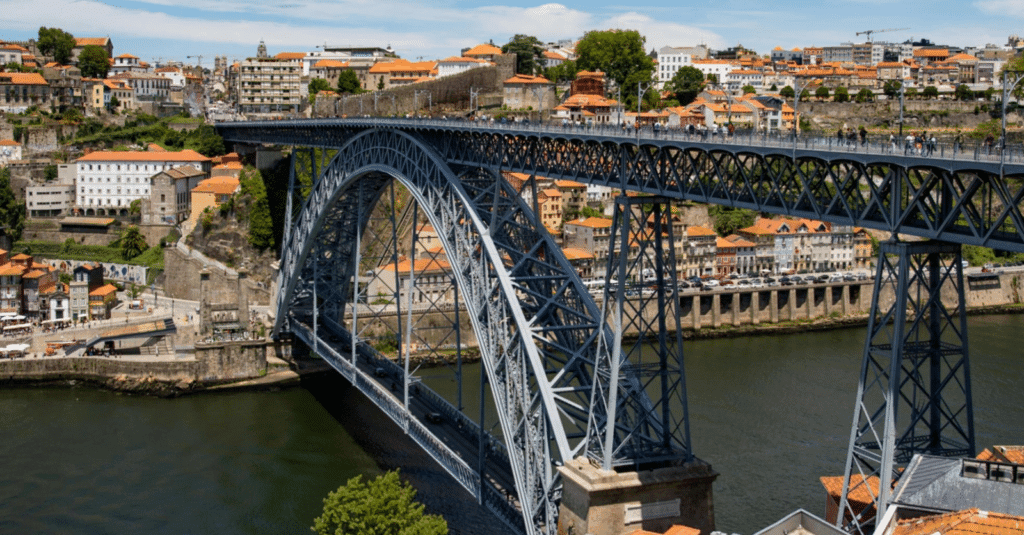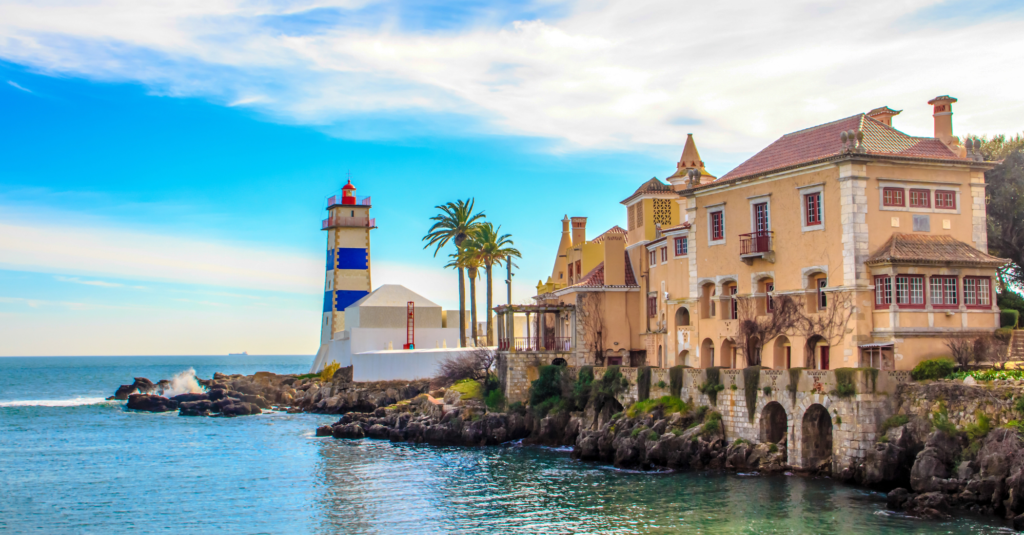Are you dreaming of residency in Portugal as an EU citizen? Whether you’re attracted to the bustling tech scene in Lisbon, the charm and vibrant culture of Porto, or want to relax along the many beaches of the Algarve, moving to Portugal as an EU citizen is a lucrative option.
As an EU citizen, you have the freedom to move between each of the EU member states. You will still have to apply for residency if you want to move to Portugal long-term.
In this blog, we are going to explore everything you need to know about obtaining residency in Portugal for EU citizens, including the benefits of Portuguese residency, the steps you must follow to move to Portugal, and popular spots to live in Portugal. So, are you ready to dive in?
Table of contents
4 Benefits of Residency in Portugal for EU Citizens
There are many benefits when it comes to obtaining residency in Portugal as an EU citizen. Moving here long-term from another EU country can be relatively straightforward, especially in comparison to moving from states outside the EU. Let’s take a look at the 4 benefits of Portuguese residency.
Access to Healthcare: As a resident, you will have access to Portugal’s National Health Service (SNS), which is renowned for its high standard of care. Access includes doctor visits, hospital services, and medication at a reduced cost.
Education Opportunities: Portuguese residency opens up access to Portugal’s education system for you and your family. Residents can attend public schools at little to no cost, as well as access to a number of internationally recognized universities!
Strong Job Market: Portugal’s growing economy presents many employment and business opportunities, especially in the tourism, tech, and renewable energy industries. Those more entrepreneurial-minded individuals can also avail themselves of tax incentives and the supportive startup ecosystem Portugal has to offer.
Path to Citizenship: After 5 years of residency, you become eligible to apply for Portuguese citizenship, granting you a Portuguese passport as well as the ability to vote in elections and many more benefits.
All of this sounds pretty tempting, right? Let’s discuss the rights of residency in Portugal as an EU citizen.
Rights of Residency in Portugal for EU Citizens
As we have mentioned, EU citizens can travel freely to and from Portugal. However, depending on how long you plan on staying in Portugal, there may be some steps you will have to take.
Staying in Portugal for less than 3 months
Planning on moving to Portugal for less than 3 months? Good news – you have nothing (or very little) to do.
As an EU citizen, if you are moving to Portugal for less than 3 months you are still considered as a tourist in the eyes of the government. Because of your short stay, you will likely have short-term accommodation. Portuguese law states that normal rentals require a minimum stay of one year. This means that you and your family can come and enjoy everything Portugal has to offer for up to 3 months while being considered tourists.
Staying in Portugal for more than 3 months
If, on the other hand, you plan on staying in Portugal for more than 3 months, there are some additional steps. You will need a residence card or a registration certificate proving your residence is authorized. This usually involves obtaining your Certificado do Registo de Cidadão da União Europeia (CRUE).
To get your CRUE, you can go to a câmara municipal or local city council. The câmara you go to will determine whether you can get your CRUE before or after the 3 months are up. The rule tends to change in different locations. Your best bet is to search your nearest câmara online and reach out to them.
No matter how long you plan on staying in Portugal, our dedicated Portuguese team at Lexidy can help you out and guide you through the process. Simply click here to learn more!
How Can We Help You?
Schedule a free consultation below and one of our lawyers will be in touch.
Steps Involved When Moving to Portugal as an EU Citizen
As you now know, EU citizens can obtain a Portuguese residence permit in just a few steps. So, let’s take a look at what you’ll need to do.
The First Three Months
We have already mentioned that EU citizens can move freely throughout the EU. You can enjoy the first three months of your stay without any extra application forms or documentation. You can use this period to get a feel for the country and see if it’s everything you have dreamed of.
However, if you plan on staying longer, it may be a good idea to get the ball rolling early to enjoy the benefits of residency. To do this, you will need to prepare some documentation for your trip to the câmara municipal.
Registering Your Residency
To make the registration process more straightforward, you should have all of the correct documentation prepared. Whether you plan on renting in Portugal or purchasing your property, obtaining a residence permit generally has the same requirements. We’ve got you covered with a list of everything you’ll need:
- A valid passport or identity card;
- Proof of address (for example property deeds, a rental contract, utility bill);
- Proof of employment or self-employment in Portugal (or evidence that you have sufficient funds to support yourself and your family);
- NIF (Número de Identificação Fiscal).
This should be enough in most cases, however, in certain circumstances, you may be asked for further documentation which, of course, we have also listed for you:
- Three months of bank statements
- Proof of enrollment in a public or private health insurance plan, valid in Portugal. This is only required if you’re not employed or self-employed
- Proof you don’t have any outstanding payments for the Portuguese Social Security Department
- A document signed by two witnesses that confirms you live where you claim to live (Atestado de Residência)
If you are missing some documentation at your appointment, be sure to make a list and bring it to the câmara as soon as possible.
Lastly, you will have to pay a small fee for the process. At the time of writing, the fee is approximately €15.
4 Most Popular Cities in Portugal to Live as an Expat
Portugal has a diverse range of lifestyles and environments to offer, catering to almost all preferences. From bustling cities to the peaceful countryside, let’s look at 4 of the most popular cities in Portugal for expats to live in.
1. Lisbon

Of course, we will start with Lisbon, the Portuguese capital and its heart of culture, politics, and the economy. Lisbon is known for its unique blend of traditional charm and modern conveniences. In addition, its well-connected public transport, strong jobs market, and stunning landscape mean it’s no wonder expats choose Lisbon as their new home.
2. Porto

Portugal’s second-largest city is famous for its breathtaking riverside views, port wine cellars, and of course its UNESCO World Heritage-listed Ribeira district. Porto is smaller and considered to have a slower pace of life than Lisbon. Porto’s growing tech scene and rich culture prove to be very attractive for expats.
3. Faro

Smaller again than both Lisbon and Porto, Faro offers endless sunny days. Faro is located in the Algarve and is just a stone’s throw from golden beaches and glorious golf courses. The relatively low cost of living as well as access to many cities through its international airport make Faro an appealing destination.
4. Cascais

A picturesque coastal town just a short train ride from Lisbon has seen Cascais become a favored spot for expats. Dotted with luxurious villas, sandy beaches and some of the best seafood Portugal has to offer, it’s easy to see why Europeans are moving here. While the cost of living is slightly higher here, many will find the price worth the quality of living.
So there you have it, the most popular Portuguese cities for EU citizens to live in. Each of these cities has something unique to offer. You can consider using your initial three months in Portugal to explore these regions.
Frequently Asked Questions About How to get Residency in Portugal for EU Citizens
Do EU citizens need a work permit for Portugal?
EU citizens do not need a work permit to work in Portugal due to the free movement of persons. However, when an EU citizen wants to live in Portugal for more than 3 months, they must register their residence with their local city council.
Can EU citizens retire in Portugal?
Yes, EU citizens can retire in Portugal. To do so, they will have to prove that they have sufficient funds to support themselves and provide proof of health insurance (retirees from the EU have access to Portuguese health insurance as long as they register for it).
Can American citizens move to Portugal?
Yes, American citizens can move to Portugal, but the process is more complex than that of EU citizens. The Portuguese government offers a variety of visas which American citizens can apply for. Be sure to speak to our team of dedicated lawyers to discover the best visa for you!
What is the cost of living in Portugal?
The cost of living in Portugal varies depending on the region. Larger cities such as Lisbon and Porto are some of the most expensive in the country, with monthly rent costing between €800 and €1,400, and between €650 and €1,100, respectively. Other options such as Faro, Braga, Viana do Castelo, Aveiro, and Coimbra have significantly lower prices, where you can rent a one-bedroom apartment for €400 to €700 per month.
Conclusion
Moving to Portugal as an EU citizen is an enticing opportunity filled with sunny days and a laid-back lifestyle. If you plan on staying in Portugal long term, be sure to apply for residency and have your documentation for a smooth process. As always, our dedicated team of experts is on hand to guide you through the process.



